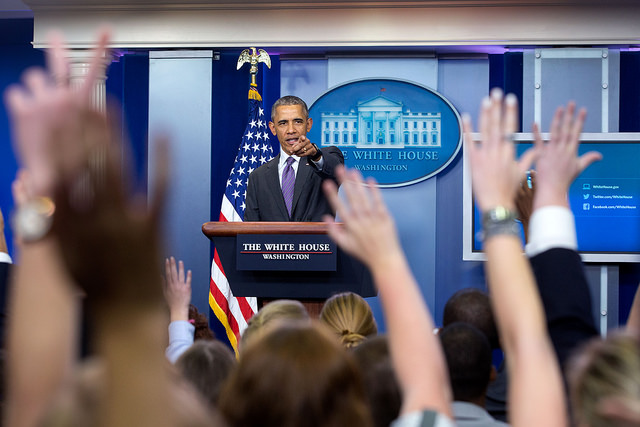
Obama fighting to save TPP as rising political tide threatens to turn against trade deal
by Alexander Panetta, The Canadian Press

Donald Trump and Hillary Clinton have come out against the deal, but the outgoing president hopes to push it through during the lame-duck session

U.S. President Barack Obama continues to fight hard for the 12-country trade deal despite growing backlash against it. PHOTO: Amanda Lucidon/The White House, via Flickr
WASHINGTON—As political quicksand threatens to swallow the 12-country Trans-Pacific Partnership trade deal, President Barack Obama says he remains determined to save it after the current U.S. election.
He expressed hope of passing it through the U.S. Congress during the two-month post-election period known as the lame-duck session, when the outgoing administration and lawmakers briefly remain in office.
In a news conference earlier this week, the president said the deal might stand a better chance of passing once the heated anti-trade rhetoric of this election season has been given time to cool down.
“Hopefully, after the election is over and the dust settled, there will be more attention to the actual facts behind the deal and it won’t just be a political symbol or a political football,” Obama said, standing with the prime minister of Singapore.
“I will sit down publicly with (lawmakers), and we will go down through the provisions. I would enjoy that, because there is a lot of misinformation. I am really confident I can make the case that this is good for American workers and the American people.
“People said we weren’t going to be able to get (fast-track authority from Congress to negotiate the deal). And somehow, we muddled through and got it done. And I intend to do the same with respect to the actual agreement.”
The deal essentially dies without U.S. ratification. To enter into force, the agreement needs to be approved by the lawmaking bodies of at least 85 per cent of the TPP region’s total economy—a mathematically impossible task without the U.S.
With the agreement’s fate suspended in the U.S., Canada’s new Liberal government has yet to confirm its own plans. Canada represents just over six per cent of the region’s economy.
The agreement would create the world’s largest trading bloc; knock down tariffs on thousands of products; bolster patent protections; and extend the dispute-settlement system where companies can sue governments before an independent tribunal.
It has become politically toxic in this U.S. campaign. Opposition to it was evident at both party conventions.
Protesters in the Democratic crowd repeatedly held up signs and heckled speakers with chants of, “Stop the TPP!” At the Republican convention, nominee Donald Trump got warm applause for promising to fight the deal.
Both presidential candidates have opposed it, with Trump the more vocal of the two.
The stated opposition of both main-party candidates has led some political observers to conclude that the lone available window for ratifying the deal in the U.S. Congress is the so-called lame-duck session between the Nov. 8 election and January.
Yet even that appears problematic.
Top lawmakers in both parties sound resistant to ramming it through. Top Senate Republican Mitch McConnell said he’s sensitive to the fact that American voters will have just elected a president opposing the deal.
“I haven’t made that call yet, but I’d say the chances are pretty slim that we’d be looking at (TPP) this year,” McConnell said last month.
His Democratic counterpart Harry Reid is even more critical. He told the Huffington Post a few days ago: “I have voted against more trade bills than anybody in the history of the country, and nobody will beat my record. So that’s how I feel about TPP.”
Obama conceded Tuesday that some of his close friends disagree with him on the issue.
But the president said he’s ready to argue his case. He said globalization is not disappearing, because the decades-long surge in international trade is driven by new technologies that aren’t going away.
He said this agreement is better than the status quo because it includes new protections for workers and the environment. For example, he credited the impending deal with spurring Vietnam to bolster its constitutional protections for unions, and for Malaysia cracking down on human trafficking.
“We are part of a global economy. We’re not reversing that,” Obama said.
“I have not yet heard anybody make an argument that the existing trading rules are better for issues like labour rights and environmental rights than they would be if we got TPP passed. And so I’m going to continue to make this case.”